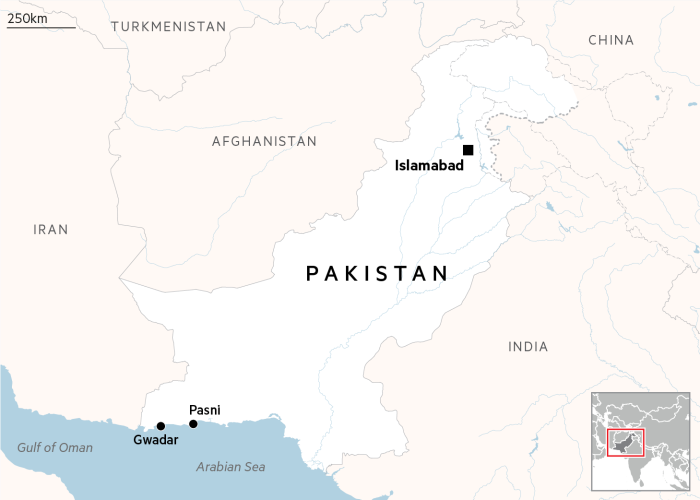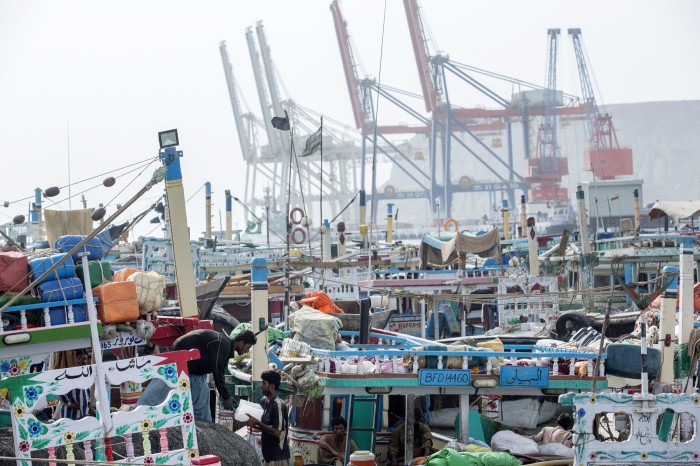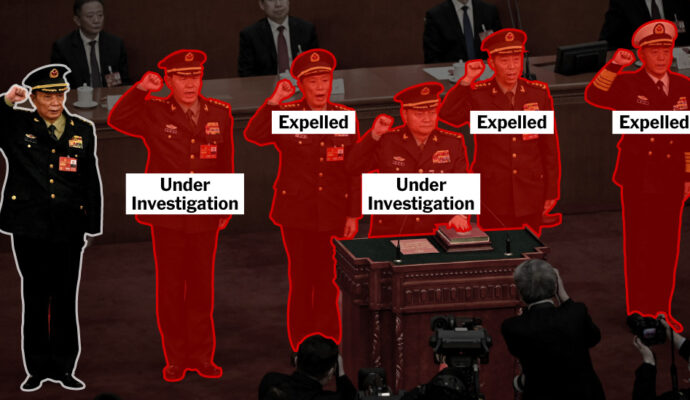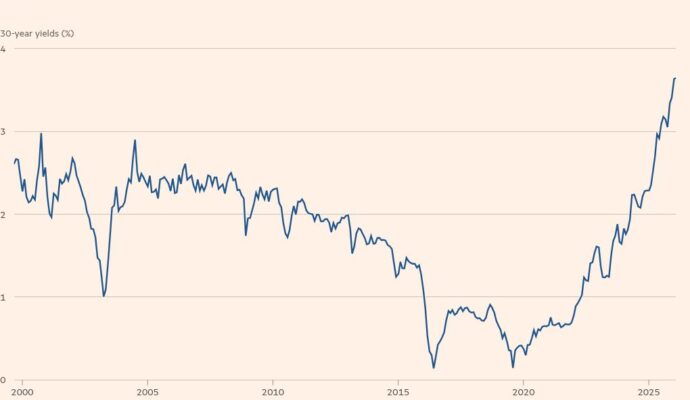Advisers to Pakistan’s military strongman Asim Munir have approached US officials with an offer to build and run a port on the Arabian Sea that could give Washington a foothold in one of the world’s most sensitive regions.
The audacious plan, seen by the Financial Times, envisages American investors developing the seaside fishing town of Pasni as a terminal for access to Pakistan’s critical minerals. Pasni is just 100 miles from Iran and 70 miles from the Pakistani city of Gwadar, which has a China-backed port.
The initiative, which is not official policy, reflects how Pakistani officials are exploring ways to capitalise on the sweeping geopolitical upheaval in South Asia of recent months.

The offer has been floated with some US officials, and was shared with Munir ahead of a meeting with Donald Trump in the White House late last month, according to two advisers to the army chief. But a senior Trump administration official said the US president and his advisers had not discussed such a proposal.
The scheme is one of several ideas floated publicly and privately by Pakistani officials to maintain momentum with the Trump administration. They include engagement with a Trump-backed crypto venture, deepening co-operation against Afghanistan-based militant group Isis-K, endorsement of his Gaza peace plan and access to critical minerals.
Munir and Trump have forged what US and Pakistani diplomats are referring to as “a bromance” since the American president claimed credit in May for a ceasefire that ended the worst fighting between Pakistan and India in decades.
After two decades of warming ties with India, the US has over the summer publicly sparred with New Delhi. While India has rejected Trump’s claims of involvement in the ceasefire, Munir and Prime Minister Shehbaz Sharif have publicly thanked him and nominated him for the Nobel Peace Prize.
In return, Trump has lavished praise on Pakistan’s army chief. After their latest meeting last month, the White House released pictures of Munir and Sharif presenting the US leader with a display case of mineral samples.
“The whole narrative [of the US-Pakistan] relationship changed after the war,” said one of the advisers, who has been involved in back-channel contacts with the Trump circle for more than a year.
“It was very bad before then. We had not tended the relationship as we should have,” the adviser said. “In the last two decades the Indians occupied the space in the vacuum.”
The proposed port at Pasni would be linked to a new railway to transport minerals from Pakistan’s interior, the advisers said, in particular copper and antimony, a vital ingredient in batteries, fire-retardant and missiles.
A blueprint anticipated the port would cost up to $1.2bn with a proposed financing model that would be a mix of Pakistani federal and US-backed development finance.
Advocates of the plan see it as a way of hedging the country’s position on the global stage as it seeks to balance a constellation of diplomatic ties with China, the US, Iran and Saudi Arabia, with which Islamabad signed a security pact last month.
“Pasni’s proximity to Iran and Central Asia enhances US options for trade and security . . . Engagement at Pasni would counterbalance Gwadar . . . and expand US influence in the Arabian Sea and Central Asia,” according to the blueprint.
“China’s Gwadar investments under the Belt and Road Initiative raise dual-use concerns,” it added, in an apparent allusion to US concerns Gwadar could serve as a Chinese naval base, a suggestion denied by Islamabad and Beijing.

China is traditionally Pakistan’s closest partner, providing much of its armoury and billions of dollars of loans and investments. Pakistan used China-supplied aircraft and weapons systems to shoot down up to six Indian aircraft in May.
The blueprint said the Pasni plan excluded “direct basing”, which the advisers said meant the port would not serve as a US military installation.
America was a close ally during the cold war and after the September 11 2001 terrorist attacks on the US, but ties frayed over Pakistan’s support for the Taliban during the Washington-led war in Afghanistan. Now it is keen to refashion links focusing on investments and trade.
“I’ve been telling our leaders we need to diversify from China,” one of the Pakistani advisers said, while maintaining the decades-old bond with Beijing. “We don’t need to consult the Chinese as it’s outside the Gwadar concession.”
In an early indication of US interest in Pakistan’s mineral sector, Missouri-based company US Strategic Metals in September signed a memorandum of understanding with Pakistan’s military engineering arm to boost collaboration.
Mike Hollomon, USSM commercial director, said the company aspired to set up a refinery and last month met directors of Pakistan’s two major ports at and near Karachi, as well as a representative from Gwadar during a visit to the South Asian country.
Hollomon added that USSM had heard talk of a possible port project near Pasni. The town had a natural deep-water port and could be linked by rail to Reko Diq, a copper and gold mine being developed by Canada’s Barrick Mining, so it made “a lot of sense” to set up a facility in the area, he said.
“In our conversations with the field marshal, he stressed that Pakistan has been an ally of the US for a long time and minerals is a way to rekindle a dormant friendship,” Hollomon said.
Late last month, Pakistan shipped a modest first consignment of fewer than two tonnes of critical and rare earth minerals to USSM that included copper, antimony and neodymium. The price of antimony has soared since Beijing imposed a ban on selling it to the US late last year.
Pakistan’s minerals sector currently contributes only about 3 per cent of its GDP, and much of its undeveloped resources are in western provinces plagued by brutal insurgencies that caused more than 2,000 deaths last year.
But Hussain Abidi, chair of the state-run Pakistan Council of Scientific and Industrial Research, said the country had vast untapped mineral potential. “This is a reset with America through economic ties rather than just the traditional security ties.”
Additional reporting by Abigail Hauslohner in Washington


